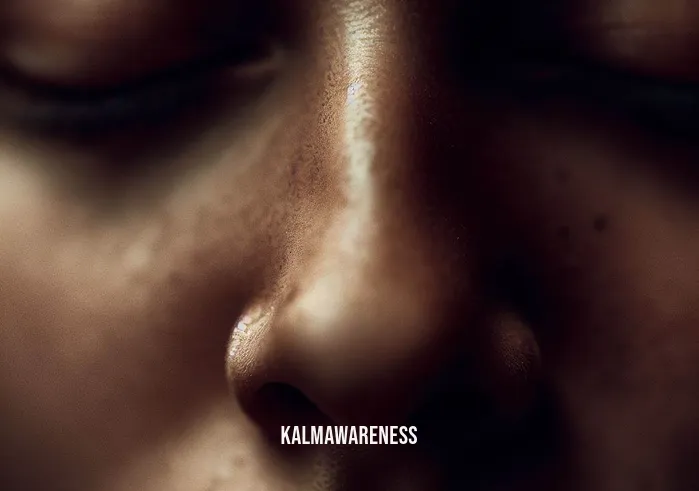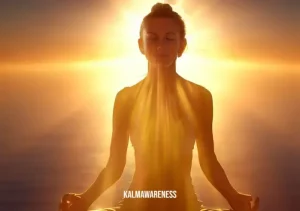The Intricate Dance Between Self Discipline and Emotional Control: Achieving Personal Growth through Mindfulness
Emotions can be tumultuous, a powerful surge that tosses us around in the stormy seas of life. They can also be calm, a soothing balm that gently sways us with its serene rhythms. What makes the difference is our ability to exercise self discipline and emotional control. It’s a delicate dance, but with practice, it can lead to personal growth and a greater sense of tranquility.
Navigating Emotional Turbulence
In our journey to achieving emotional control, we often encounter bouts of inward emotional turbulence. It is an inherent part of the human experience, an internal storm that can either leave us feeling battered or bestow upon us the resilience to weather future squalls.
Practicing mindfulness provides us the tools necessary to navigate these tempests. Mindfulness teaches us to observe our feelings without getting swept away. By training the mind to respond, not react, we cultivate the capacity to remain balanced amidst the chaos. It’s a crucial step towards holding you during difficult days and invites us to keep breathing despite the storm.
“Emotional control isn’t about suppressing our feelings; it’s about understanding them.”
Cultivating Self Discipline
While emotional control is the sail that guides us amidst the storm, self-discipline is the rudder that keeps our ship on course. It involves the ability to regulate our actions and reactions, a skill that requires consistent practice and patience.
Patience, after all, is a virtue. It’s a character trait that not only helps us in weathering the storms but also in keeping our composure amidst the turbulence. When we find ourselves on the verge of losing patience, it’s crucial to pause and take a step back. Breathe deeply. Observe the rush of emotions without getting carried away. This practice of mindful patience can help us in keeping our cool under pressure.
The art of self-discipline is also closely linked with the practice of conscious discipline phrases. These phrases, akin to mantras, can serve as reminders for us to return to the present moment and maintain our focus on self-regulation. In the grand scheme of our personal growth journey, they serve as signposts, guiding us towards achieving greater control over our actions and reactions.
Mindfully Managing Cravings
Emotional control and self-discipline often intersect in the realm of managing cravings. Whether it’s food, screens, or unhealthy habits, cravings can often lead to a loss of control. But, with mindfulness, we can learn how to manage these cravings.
Fasting, for instance, is a traditional practice that has been used for centuries to enhance self-discipline and emotional control. When coupled with mindfulness and meditation, it can teach us to observe our cravings without succumbing to them. It invites us to experience discomfort, observe it, and ultimately transcend it.
Before we conclude this first part of our journey, let’s remember that cultivating self discipline and emotional control is a journey, not a destination. It is a dance that requires constant practice, patience, and awareness.
In the next chapter, we will delve deeper into how mindfulness practices such as meditation and martial arts can aid us in maintaining our composure and cultivating emotional balance. We will also explore how our smartphones can often be a hurdle to achieving emotional control and self-discipline and ways to smartly manage this ubiquitous technology. Stay tuned, and let’s continue this journey together.
Continue to the next part of the article to uncover the transformative power of mindfulness and self-discipline.
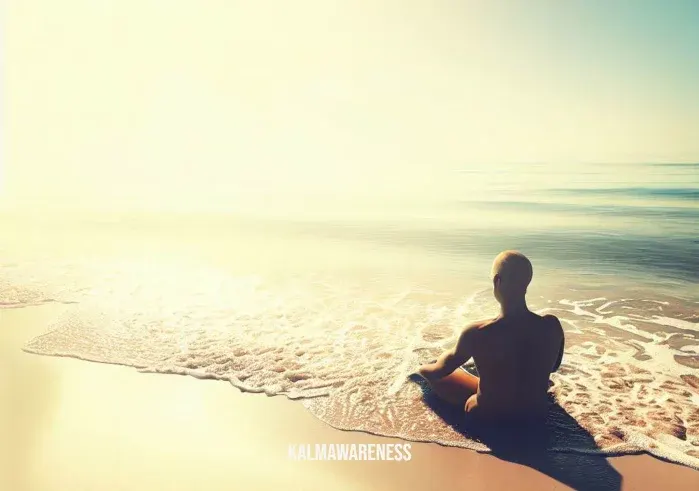
The Pathway to Mindful Balance: Techniques and Tools for Emotional Control and Self-Discipline
As we continue this exploration into the intricate dance between self-discipline and emotional control, it is time to examine the techniques and tools that can guide us in maintaining balance and inner calm. Mindfulness, a practice rooted in ancient Buddhist philosophy, offers a multitude of methods that can aid us in regulating our emotional states and cultivating a disciplined mind.
Mindfulness in Martial Arts
Martial arts has long been recognized as a discipline that nurtures both the body and mind. Not only does it promote physical fitness and self-defense, but it also teaches emotional control and self-discipline. Martial arts practices such as Tai Chi and Aikido, and even the meditative practices of Bruce Lee, emphasize mental concentration, self-awareness, and tranquility. Practicing martial arts in combination with meditation offers an effective strategy to gain control over your emotional and physical responses.
Being Smarter Than Your Smartphone
In our digital age, smartphones and other devices can often disrupt our journey towards self-discipline and emotional control. The constant notifications, the limitless scrolling, and the never-ending cycle of digital consumption can lead to an emotional and cognitive overload. By understanding how to be smarter than your smartphone, we can reclaim control over our time and attention, enhancing our emotional balance and self-discipline in the process.
Mindful Mood Balance
Achieving mindful mood balance is crucial to emotional control and self-discipline. By learning to identify our emotional states, understanding their transitory nature, and responding to them with awareness and acceptance, we can achieve a state of equilibrium. The practice of mindfulness teaches us that emotions, like clouds, pass by. We learn to observe them without getting swept away.
To help you on this journey, let’s examine a table outlining five key practices and their effects on our emotional control and self-discipline.
| Practice | Description | Benefit | Examples | Relevant link |
|---|---|---|---|---|
| Meditation | Mindfully focusing on the present moment | Enhances emotional awareness and self-regulation | Mindfulness Meditation, Loving-kindness Meditation | Meditation for BPD |
| Mindful Eating | Paying attention to the experience of eating | Helps control cravings and develop healthier eating habits | Slowly savoring each bite, acknowledging the source of your food | Mindfully manage food cravings |
| Digital Detox | Limiting screen time | Reduces digital distraction and improves focus | Designated screen-free hours, turning off unnecessary notifications | Be smarter than your smartphone |
| Conscious Discipline | Mindfully managing behavior | Enhances self-control and patience | Using conscious discipline phrases, setting clear boundaries | Conscious discipline phrases |
| Physical Exercise | Regular physical activity | Improves mood, reduces stress, and enhances self-discipline | Yoga, Martial Arts, Walking | Meditation in martial arts |
The art of self-discipline and emotional control is like a journey through a labyrinth. It is a winding path that requires patience, practice, and persistence. But with the right tools and techniques, we can navigate it with grace and composure.
In the next part of this series, we will explore further the role of self-discipline in personal growth, the power of non-reactivity, and how mindful behavioral solutions can assist us in managing emotional upheavals. Join us on this continued journey into the heart of mindfulness, self-discipline, and emotional control.

The Journey Continues: Self-Discipline, Emotional Control, and Personal Growth
Moving forward on our journey of self-discipline and emotional control, we now delve into the world of personal growth. Personal growth involves consciously striving to improve oneself and to make the most out of life. It has profound connections with self-discipline and emotional control, as it requires a commitment to change and a willingness to step outside one’s comfort zone.
Self-Discipline: The Key to Personal Growth
Self-discipline is a potent catalyst for personal growth. As Jim Rohn, a renowned motivational speaker, once said, “Discipline is the bridge between goals and accomplishment.” Through self-discipline, we gain the power to control our mind, overcome procrastination, and pursue our goals relentlessly. It is the practice of making decisions that serve our long-term interests, even when they might not be immediately appealing or easy.
We find an excellent representation of the relationship between self-discipline and personal growth in the world of athletics. Olympic athletes, for example, embody this connection. Their incredible feats of skill and endurance are a testament to years of disciplined training, emotional control, and an unwavering commitment to personal growth. A closer look at their journey can teach us much about the nature of self-discipline, emotional control, and the path to personal growth.
Non-Reactivity: A Pillar of Emotional Control
“Between stimulus and response, there is a space. In that space is our power to choose our response. In our response lies our growth and our freedom,” noted Viktor E. Frankl, a prominent psychiatrist and Holocaust survivor. This quote brilliantly encapsulates the concept of non-reactivity, a crucial element of emotional control.
Non-reactivity is the practice of pausing and consciously choosing our reactions instead of being swept away by automatic responses. By training our mind to respond rather than react, we develop greater emotional control and create the necessary space for self-discipline to flourish.
Mindful Behavioral Solutions: Managing Emotional Turmoil
At times, emotions can feel overwhelming. They can surge like a tide, threatening to sweep us off our feet. This is where mindful behavioral solutions come into play. These are strategies that help us navigate emotional upheavals with grace and composure. They involve becoming aware of our emotional states, understanding their impermanent nature, and learning to respond to them in a mindful and controlled manner.
Thich Nhat Hanh, the Zen Buddhist master, offered a beautiful metaphor for this practice: “Feelings come and go like clouds in a windy sky. Conscious breathing is my anchor.” We can learn to anchor ourselves in the face of emotional turbulence by mindfully calming the limbic system and practicing non-reactivity.
Self-discipline, emotional control, and personal growth form an interconnected triangle. Each aspect supports and strengthens the others, creating a balanced and harmonious path toward a fulfilling life.
As we continue our exploration, we will delve deeper into the concept of mindful self-control in Buddhism, the role of patience in emotional control, and ways to effectively manage cravings. Stay tuned for these insights and more, as we keep unfolding the intricate layers of self-discipline and emotional control.
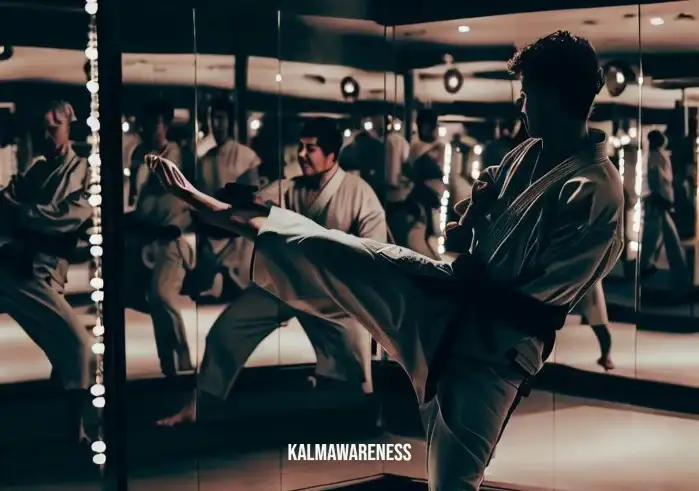
Harnessing Self-Discipline and Emotional Control for Personal Empowerment
Continuing our exploration of self-discipline and emotional control, we shift our focus to the empowering aspect of these two elements. Both self-discipline and emotional control can be transformative, providing us with the tools to take charge of our lives and our reactions to situations that we encounter.
Patience and Emotional Control
It’s essential to understand the importance of patience in emotional control. It’s often said that patience is a virtue, and this couldn’t be truer when it comes to managing emotions. To quote Molière, “Trees that are slow to grow bear the best fruit.” Similarly, developing emotional control requires patience, but the rewards are significant and long-lasting. It helps us avoid impulsive actions and make more considered decisions. Our piece on patience as a virtue provides more insights into this essential quality.
The Power of Mindful Habits
Inculcating mindful habits into our daily routines can play a key role in self-discipline and emotional control. One such mindful habit is meditation. It has been a cornerstone in disciplines that require focus and self-control, such as martial arts. In fact, Bruce Lee, a prominent martial artist, used meditation to enhance his self-discipline and emotional control. You can find more about his approach to meditation in martial arts here.
Meditation practices also have the potential to aid in resetting affective circuits, thereby offering a way to manage and regulate our emotions better. The practice teaches us to be in the present moment, enabling us to respond instead of reacting to situations.
Mindfully Managing Cravings
Managing cravings is another critical aspect of self-discipline and emotional control. Whether these cravings are related to food, technology, or any other aspect of life, the ability to manage them effectively is essential. Mindfulness plays a significant role here, teaching us to acknowledge the craving without acting on it. To better understand this, our post on how to mindfully manage food cravings offers a detailed exploration.
The Relationship Between Self-Discipline, Emotional Control, and Personal Growth
To visualize how these elements interact and support each other, let’s consider the following table:
| Self-Discipline | Emotional Control | Personal Growth | Outcome | Example |
|---|---|---|---|---|
| Resisting Temptations | Managing Cravings | Developing Healthy Habits | Improved Health | Choosing a salad over a burger |
| Consistency in Exercise | Managing Stress | Improved Physical Fitness | Increased Stamina | Regularly running or working out |
| Limiting Screen Time | Managing Technological Cravings | Improved Productivity | Better Work Output | Finishing a report on time |
| Regular Meditation | Enhancing Emotional Balance | Enhanced Focus | Improved Mental Clarity | Being able to focus on a complex task |
| Saving Money | Controlling Impulsive Buying | Financial Growth | Financial Stability | Saving for retirement |
This exploration of self-discipline, emotional control, and personal growth should provide us with tools to overcome challenges and pursue our personal and professional goals more effectively. As we move to the next part of our journey, we’ll focus on the role of self-discipline and emotional control in maintaining composure under pressure, how to mindfully manage impatience, and the link between self-discipline and Buddhism. Stay with us as we continue this enlightening journey.

The Art of Maintaining Composure and the Spiritual Connection
The journey of mastering self-discipline and emotional control is indeed a profound one. It is not just about willpower or conscious decision-making; it is also about deepening our understanding of ourselves and our relationship with the world around us. Let’s continue our exploration by delving into the art of maintaining composure and the spiritual dimensions of self-discipline.
Maintaining Composure Under Pressure
“Pressure is something you feel when you don’t know what the hell you’re doing.” – Peyton Manning
Manning’s quote hits home, especially when discussing the necessity of emotional control and self-discipline in maintaining composure under pressure. It’s easy to lose our cool when the stakes are high and the pressure mounts. Yet, the ability to stay composed is one of the hallmarks of emotional maturity and self-discipline. It is a skill that can be learned and honed. The art of keeping your composure is a fascinating exploration of this concept.
Mindfully Managing Impatience
Impatience can be a significant roadblock on our path to emotional control. We live in a fast-paced world where immediate gratification often seems to be the norm. However, we need to master the art of waiting patiently. This does not mean passive acceptance; rather, it’s about mindfully acknowledging our feelings and making conscious choices instead of impulsive decisions. Our resource on running out of patience provides a deeper insight into this topic.
The Spiritual Connection
Self-discipline and emotional control also have deep roots in spiritual traditions. One such tradition is Buddhism, which places great emphasis on self-control as a means of attaining enlightenment. In Buddhism, self-discipline (or ‘Brahmacarya’) is considered one of the fundamental principles of ethical conduct. It signifies control over all senses and helps in managing one’s behavior, actions, and decisions. You can delve deeper into this subject with our piece on Buddhist self-discipline.
Emotional Turbulence and Mindfulness
Everyone experiences emotional turbulence at some point. It can feel like a storm brewing inside, threatening to topple our carefully constructed self-discipline. However, with emotional control, we can learn to weather these storms. Mindfulness, the practice of being present in the moment without judgment, is a powerful tool in this regard. When we are mindful, we are better able to identify our emotions, understand their sources, and choose how to respond to them, rather than react impulsively. Our exploration on inward emotional turbulence further unpacks this concept.
Taming the Mind
In the end, self-discipline and emotional control come down to ‘taming the mind.’ It is about learning to control our thoughts, emotions, and actions. As we learn to navigate our minds, we become more adept at navigating the world. We invite you to explore taming the mind to understand this better.
As we continue our journey in the next chapter, we will delve into the science behind self-discipline and emotional control. How does our brain react to discipline and emotional regulation? How does the mind-body connection influence self-discipline and emotional control? Continue with us as we delve deeper into these fascinating topics.
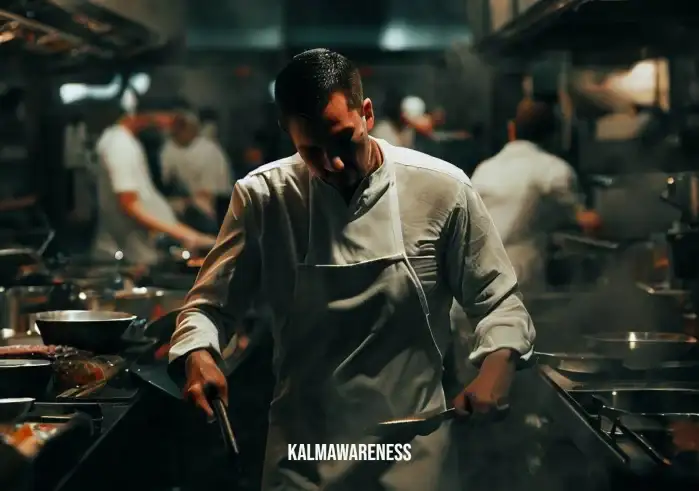
Harnessing the Power of Your Mind for Emotional Control and Self Discipline
In the quest for self discipline and emotional control, it’s essential to acknowledge the magnificent power that lies within us: our mind. It’s not merely an abstract concept, but a potent tool that can shape our emotions, behavior, and ultimately our life. Let’s further uncover the depths of this fascinating aspect.
The Mindful Habit
“Habit is stronger than reason.” – George Santayana
Habits are automatic behavioral patterns that shape our lives significantly. Understanding how to harness this automaticity is key to developing self-discipline. In essence, the act of cultivating self-discipline is the act of creating new habits – the mindful habits. To discover more about the crucial role habits play in self-discipline, we recommend you to explore our thoughts on the mindful habit.
Meditation: A Powerful Tool for Discipline
Meditation isn’t just a spiritual practice; it’s a science-backed technique for enhancing self-discipline and emotional control. Regular meditation practice helps us create space between our emotions and reactions, allowing us to respond thoughtfully rather than react impulsively. Furthermore, mindfulness meditation is an excellent tool for fostering emotional regulation. To explore this, you might find the meditation in martial arts article interesting.
Keeping Cool Under Pressure
When the pressure rises, how do we maintain our composure? It’s all about understanding and applying techniques to regulate our emotional responses. Simple strategies such as deep breathing or cognitive reframing can help us maintain control even under extreme pressure. Learn more about this in our article on keeping cool under pressure.
Understanding Our Emotions: The Key to Control
Understanding our emotions is the first step towards controlling them. It’s crucial to learn to identify our feelings and understand why we’re experiencing them. We often avoid uncomfortable emotions, but confronting them head-on is essential for emotional control. This topic is further discussed in the article intentionally avoiding thoughts of an unpleasant emotion.
Harnessing the Power of Our Mind
Finally, it’s crucial to remember the words of Marcus Aurelius, who said, “You have power over your mind – not outside events. Realize this, and you will find strength.” This sentiment truly encapsulates the essence of self-discipline and emotional control. It’s about understanding that while we can’t control everything that happens to us, we can control how we react. Discover more in our article on power over your mind.
In the next chapter, we’ll delve into how technology impacts our self-discipline and emotional control, and the role mindfulness plays in our relationship with technology. Stay tuned to delve further into this exciting journey of self-discovery and growth.


